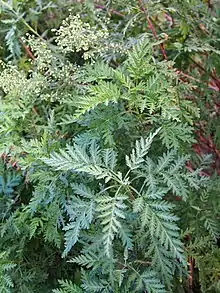Artemisia gmelinii
Artemisia gmelinii, also known as Artemisia sacrorum and Russian wormood, is a shrub in the family Asteraceae. It is native to China, Russia, Japan, and other parts of central Asia.[1] A. gmelinii contains Veratric acid.[2]
| Artemisia gmelinii | |
|---|---|
 | |
| Scientific classification | |
| Kingdom: | Plantae |
| Clade: | Tracheophytes |
| Clade: | Angiosperms |
| Clade: | Eudicots |
| Clade: | Asterids |
| Order: | Asterales |
| Family: | Asteraceae |
| Genus: | Artemisia |
| Species: | A. gmelinii |
| Binomial name | |
| Artemisia gmelinii Weber ex Stechm. | |
It could be edible. In Korea, the leaf and stem are used to treat hepatitis, hyperlipaemia and infected cholecystitis. It contains flavonoids, sesquiterpenes and other bio-active constituents. This plant has 1% essential oil.[3]
References
- "Artemisia gmelinii Weber ex Stechm. | Plants of the World Online | Kew Science". Plants of the World Online. Retrieved 2023-05-25.
- PubChem. "Artemisia sacrorum". pubchem.ncbi.nlm.nih.gov. Retrieved 2023-05-25.
- "Artemisia gmelinii Russian Wormwood, Gmelin's wormwood PFAF Plant Database". pfaf.org. Retrieved 2023-09-06.
This article is issued from Wikipedia. The text is licensed under Creative Commons - Attribution - Sharealike. Additional terms may apply for the media files.